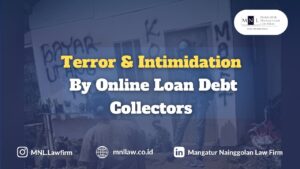
The acts of terror and intimidation by online loan (pinjol) debt collectors have caused trauma to debtors and public unrest. Although illegal online loan applications suspected of using terror and intimidation for debt collection have been cracked down on, the debt collection practices of online loans are still considered a “frightening specter.” Therefore, it is important to understand the regulations surrounding online loan collections.
Online Loan Collection Ethics
The Financial Services Authority (OJK), as the institution responsible for supervising financial service providers, including fintech companies (which distribute online loans), has issued various regulations. Most recently, the OJK issued Financial Services Authority Regulation Number 22 of 2023 on Consumer Protection in the Financial Services Sector (“POJK 22/2023”)
Article 62 of POJK 22/2023 prohibits debt collection using violence, threats, or methods that humiliate consumers. If there is a violation of this provision, fintech service providers may be subject to administrative sanctions, including fines of up to IDR 15 billion and revocation of their licenses.
Furthermore, OJK issued a Circular Letter of the Financial Services Authority of the Republic of Indonesia Number: 19/SEOJK.06/2023 on the Implementation of Information Technology-Based Joint Funding Services (“SEOJK No. 19/2023”). According to SEOJK No. 19/2023, debt collectors, whether employed by fintech service providers or third parties, must adhere to the following ethics:
- Use an official identity card issued by the collaborating party with a photo of the individual concerned.
- Debt collection must not involve threats, violence, and/or acts that humiliate the Borrower.
- Debt collection must not involve physical or verbal pressure.
- Avoid using words and/or actions that intimidate or demean ethnicity, religion, race, and inter-group relations (SARA), dignity, or self-respect, either in physical interactions or online (cyberbullying) toward Borrowers, their emergency contacts, relatives, colleagues, families, or their property.
- Debt collection must not be directed at parties other than the Borrower.
- Use of communication channels for collection must not be continuous to the point of being disruptive.
- Debt collection may only be conducted through private channels, at the Borrower’s billing address or domicile.
- Debt collection may only occur between 8:00 AM and 8:00 PM local time at the Borrower’s address.
- Collection outside the specified time and/or place may only occur with prior agreement and/or consent of the Borrower.
What to Do If Online Loan Collections Use Threats or Violence
- Collect Evidence
Before engaging in conversation, ask for the debt collector’s identity, including name and whether they are internal staff (fintech employees) or external (third-party collection agency).
Evidence can include: phone call recordings, WhatsApp screenshots, noting the collector’s name, saving proof of collection attempts outside working hours, and recording collector details.
- Report to OJK
Prepare a chronology and attach supporting evidence.
- Report to the Police
If there are physical threats or extortion attempts, file a report with the police and bring your evidence. Relevant articles include Article 368 of the Criminal Code and Article 29 of Law No. 1 of 2024 on Electronic Information and Transactions (ITE Law).
- Seek Legal Advice
If you remain unsure, consult a law office to obtain legal assistance.
SANCTIONS FOR ONLINE LOAN PROVIDERS WHO VIOLATE REGULATIONS
Fintech companies that continue to engage in collections using threats and/or violence may face the following sanctions depending on the severity of their violations:
- Written warnings;
- Restrictions on products and/or services and/or business activities, in part or in full;
- Suspension of products and/or services and/or business activities, in part or in full;
- Dismissal of management;
- Administrative fines up to IDR 15,000,000,000 (fifteen billion rupiah);
- Revocation of product and/or service licenses; and/or
- Revocation of business licenses.
LEGAL REFERENCES
- Law Number 21 of 2011 on the Financial Services Authority;
- Financial Services Authority Regulation Number 22 of 2023 on Consumer Protection in the Financial Services Sector;
- Circular Letter of the Financial Services Authority of the Republic of Indonesia Number: 19/SEOJK.06/2023 on the Implementation of Information Technology-Based Joint Funding Services.
Authors:
Muhammad Arief Ramadhan, S.H.
Dina Normanza Sibagariang
Editor:
Muhammad Arief Ramadhan, S.H.
